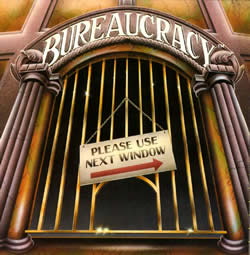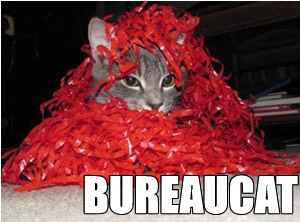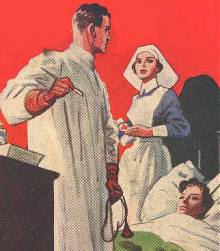...formed in Karachi in 1992 under by Muhammad Saleem Qadri. It quickly fell to trading fisticuffs and liquidations with the MQM and the Sipah-e-Sahaba, with at least a half dozen of its major leaders rubbed out. Sunni Tehreek arose to become the primary opposition to the Deobandi Binori Mosque, headed by Nizamuddin Shamzai, who was eventually bumped off by person or persons unknown. ST's current leadership has heavily criticized the Deobandi Jihadi leaders, accusing them of being sponsored by Indian Intelligence agencies as well as involvement in terrorist activities...
In 1990, nine leaders of the Barelvi sect decided to get organized to protect their interests in the face of what they saw as the growing influence of Wahabism during the regime of Gen Zia ul Haq
 ...the creepy-looking former dictator of Pakistain. Zia was an Islamic nutball who imposed his nutballery on the rest of the country with the enthusiastic assistance of the nation's religious parties, which are populated by other nutballs. He was appointed Chief of Army Staff in 1976 by Prime Minister Zulfikar Ali Bhutto, whom he hanged when he seized power. His time in office was a period of repression, with hundreds of thousands of political rivals, minorities, and journalists executed or tortured, including senior general officers convicted in coup-d'état plots, who would normally be above the law. As part of his alliance with the religious parties, his government helped run the war against the Soviets in Afghanistan, providing safe havens, American equipiment, Saudi money, and Pak handlers to selected mujaheddin. Zia died along with several of his top generals and admirals and the then United States Ambassador to Pakistain Arnold Lewis Raphel when he was assassinated in a suspicious air crash near Bahawalpur in 1988...
...the creepy-looking former dictator of Pakistain. Zia was an Islamic nutball who imposed his nutballery on the rest of the country with the enthusiastic assistance of the nation's religious parties, which are populated by other nutballs. He was appointed Chief of Army Staff in 1976 by Prime Minister Zulfikar Ali Bhutto, whom he hanged when he seized power. His time in office was a period of repression, with hundreds of thousands of political rivals, minorities, and journalists executed or tortured, including senior general officers convicted in coup-d'état plots, who would normally be above the law. As part of his alliance with the religious parties, his government helped run the war against the Soviets in Afghanistan, providing safe havens, American equipiment, Saudi money, and Pak handlers to selected mujaheddin. Zia died along with several of his top generals and admirals and the then United States Ambassador to Pakistain Arnold Lewis Raphel when he was assassinated in a suspicious air crash near Bahawalpur in 1988.... Several mosques, seminaries and shrines belonging to Barelvi Moslems were targeted or occupied with indirect support from the Zia government.
Saleem Qadri, Abbas Qadri, Iftikhar Bhatti, Dr Abdul Qadeer, Akram Qadri, Abdul Aziz Chishti, Shadab Akmal, Waheed Qadri, and Saleem Raza founded Pakistain Sunni Tehrik with the specific aim of protecting their shrines and mosques. In the two decades that followed, they were all killed.
Saleem Qadri, the chief of the party, was killed along with his bodyguards, driver and nephew in Bloody Karachi
...formerly the capital of Pakistain, now merely its most important port and financial center. It may be the largest city in the world, with a population of 18 million, most of whom hate each other and many of whom are armed and dangerous...
in 2002. His successor, Abbas Qadri, was among 50 other key men killed in a suicide kaboom during a public meeting in Nishtar Park. Since then, the party has been led by Sarwat Ejaz Qadri.
The Kashmire jihad was at its peak in the 1990s and Bloody Karachi was home to operatives from a number of state-backed Jihadi outfits, who were also anti-Shia and anti-Barelvi. Besides fighting in Kashmire, beturbanned goons from these organizations were also targeting Shias and Barelvis all over Pakistain.
Some analysts say the Sunni Tehrik began as an armed wing of the Barelvi Jamaat Ulema-e-Pakistain (led by Shah Ahmed Noorani). Qadri denies that. "Our mandate was to launch a legal and constitutional struggle for our rights," he said in an interview. "We held peaceful protests against the occupation of our mosques and seminaries, met local administration officials to convey our concerns, and challenged the illegal occupations in courts."
In 2002, the group decided to participate in electoral politics. Not too long after it began its political journey with a tree planting campaign in Bloody Karachi, Saleem Qadri was assassinated. The loss set back their campaign for the local elections. In 2008, Sunni Tehrik did not win a seat, but ranked fourth in Bloody Karachi, after the MQM, the PPP, and the MMA.
As the party gained influence, it was also accused of extortion. There are allegations that Sunni Tehrik takes protection money from traders in its areas of influence in Bloody Karachi. Qadri says they are false. "There is a difference between donation and extortion."
Born in Quetta on July 14, 1961, Sarwat Qadri is a son of a civilian employee of Pakistain Navy. He has a Bachelor's degree from the University of Bloody Karachi, and a diploma in Mechanical Engineering from Government College of Technology, Bloody Karachi. Before joining Sunni Tehrik, he was a member of Dawat-e-Islami, a Barelvi preaching outfit.
He said education was among the four key points in his party's manifesto. "Education is the most important thing. Without education, Pakistain will never progress." Qadri has been to Japan twice on scholarship, while he was working in the Japanese company Pak-Suzuki. "When bombs were dropped on the Japanese, they did not pick up weapons in response. They did not starting abusing the enemy. They did not start massacring people. They gave their children education and sent them to the same country for higher education that had dropped nuclear bombs on them." He is proud his children went to missionary schools.
Other key postulates of the Sunni Tehrik manifesto are faith, tolerance, and equality. Qadri admits his party has a long way to go.
Among the major hurdles it has to face is violence from sectarian outfits. The Sunni Tehrik blames Sipah-e-Sahaba for attacks on Barelvi leaders. Sarwat Qadri believes those who bomb their mosques are themselves committing blasphemy. "Those who are bombing mosques and desecrating the Holy Koran, those who are beheading innocent people, those who are orchestrating terrorist attacks and liquidations, how can they call themselves Moslems? They are an insult to Islam."
"Islam is a religion of peace," Qadri said to a question about violent protests in response to incidents of blasphemy. "It does not permit murder," he said. "It does not ordain beheading innocent people." But he does glorify Mumtaz Qadri, the man who assassinated Punjab governor Salmaan Taseer.
Like all rightwing parties, the Sunni Tehrik is critical of the US. Sarwat Qadri blames the US for terrorism and sectarian violence in Pakistain, because it backed bad boy groups during the Afghan jihad, which he says was carried out with Saudi money.
Sunni Tehrik has 350 offices all over Pakistain, and claims it has hundreds of thousands of members. But it has not been able to win even a single seat in the parliament. The reason for that, according to Sarwat Qadri, is that Pak politics are based on castes and clans. "People don't vote for a cause," he says, "they vote for a caste."
Qadri's high-security gated enclave guarded by coppers and dozens of volunteers is a stark reminder of the security problems in Bloody Karachi. The reason, he believes, is that people in the government are trying to protect their own interests.
"The government can enforce its writ whenever it wants," he said. "It knows who the beturbanned goons are and where are they hiding. When it will decide that it has to cleanse the city of terrorism, not a single terrorist will survive."
The Sunni Tehrik is known for its stance against suicide kabooms. Clerics from the party have issued an edict that says suicide attacks are not allowed in Islam. One of them, Dr Sarfraz Naeemi of Darul Naeemia, is said to have been assassinated because of that edict.
The writer is an Islamabad based journalist and researcher. His work is archived at www.pol-dev.com.

 [Dawn] In the last six years, the prosecution in the Nishtar Park blast case has presented for examination only one witness before an anti-terrorism court in one of the major acts of terrorism that claimed the lives of over 50 people, including the top leadership of the
[Dawn] In the last six years, the prosecution in the Nishtar Park blast case has presented for examination only one witness before an anti-terrorism court in one of the major acts of terrorism that claimed the lives of over 50 people, including the top leadership of the  Three accused said to be associated with the proscribed
Three accused said to be associated with the proscribed  Initially, the case was sent to the ATC-V,
Initially, the case was sent to the ATC-V,  Troops were deployed in Karachi on Thursday as trouble broke out before funerals for Sunni Muslim leaders who were among 60 people killed in a suicide blast two days ago. An estimated 50,000 people, a vast majority of them young men and teenagers, attended the funeral prayers and burial of the top religious leaders on MA Jinnah Road on Thursday evening. Ten top leaders of the
Troops were deployed in Karachi on Thursday as trouble broke out before funerals for Sunni Muslim leaders who were among 60 people killed in a suicide blast two days ago. An estimated 50,000 people, a vast majority of them young men and teenagers, attended the funeral prayers and burial of the top religious leaders on MA Jinnah Road on Thursday evening. Ten top leaders of the  KARACHI: The stunned crowd that took the dead and the injured to the three hospitals of the city on Tuesday, was so emotionally charged that it ended up manhandling and threatening doctors and paramedics at the institutions. Doctors at Jinnah, Liaquat and Civil hospitals all said that the mobs were hysterical and went straight at the staff. A doctor at Liaquat National Hospital said that the crowd had beaten up the doctors.
KARACHI: The stunned crowd that took the dead and the injured to the three hospitals of the city on Tuesday, was so emotionally charged that it ended up manhandling and threatening doctors and paramedics at the institutions. Doctors at Jinnah, Liaquat and Civil hospitals all said that the mobs were hysterical and went straight at the staff. A doctor at Liaquat National Hospital said that the crowd had beaten up the doctors.  Top leaders of the
Top leaders of the  The
The  KARACHI: Sporadic violence spread throughout the city, starting Saturday evening and continuing past midnight after rumours spread that Sunni Tehreek (ST) leader Maulana
KARACHI: Sporadic violence spread throughout the city, starting Saturday evening and continuing past midnight after rumours spread that Sunni Tehreek (ST) leader Maulana